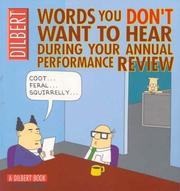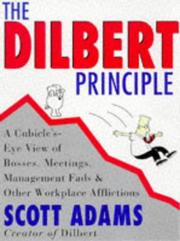| Listing 1 - 4 of 4 |
Sort by
|

ISBN: 0752224220 Year: 2003 Publisher: London Boxtree
Abstract | Keywords | Export | Availability | Bookmark
 Loading...
Loading...Choose an application
- Reference Manager
- EndNote
- RefWorks (Direct export to RefWorks)
Words You Don't Want to Hear During Your Annual Performance Review updates loyal readers on the mind-numbing careers of Dilbert, Wally, Alice, the PHB himself, and an ever-expanding cast of walk-on ''guest stars.'' In this installment, a cash-sucking ''consultick'' burrows under the boss's skin, a not-so-grim reaper pops anti-depressants, and a lab accident turns Dilbert into a sheep-a transformation which goes barely noticed by his beleaguered coworkers. All the while, Adams takes his patented over-the-top but right-on-the-money jabs at the inanity of the corporate world.
Management --- Dilbert --- comic --- office humor --- corporate world

ISBN: 0752224700 9780752224701 Year: 2001 Publisher: London: Boxtree,
Abstract | Keywords | Export | Availability | Bookmark
 Loading...
Loading...Choose an application
- Reference Manager
- EndNote
- RefWorks (Direct export to RefWorks)
Management --- Office politics --- Personnel management --- Management --- Adams, Scott, - 1957- - Dilbert
Book
ISBN: 9020931016 9026967756 Year: 1997 Publisher: Tielt Lannoo
Abstract | Keywords | Export | Availability | Bookmark
 Loading...
Loading...Choose an application
- Reference Manager
- EndNote
- RefWorks (Direct export to RefWorks)
In een wereld vol marketingstrategieën, reorganisaties en mee¬denkende secretaresses heeft Dilbert zich ontwikkeld tot de spreek¬buis van het kantoorpersoneel. Miljoenen witteboordenmedewerkers hangen de strips van Scott Adams aan de muur, vooral omdat het daar vastnagelen van de baas in eigen persoon wat te ver gaat.Nadat hij zeventien jaar lang de geneugten proefde van een werkplek voor zichzelf en vele duizenden e-mails van anderen, die zijn 'afgeslankt', 'gereorganiseerd', 'verplat' of overgeplaatst naar 'kwaliteitsteams' beperkt Scott Adams zich niet langer tot zijn klein¬schalige strip. In een onomwonden poging zichzelf een fors stuk toe te bedelen van de taart die de markt van bedrijfsboeken tegenwoordig vormt, presenteert hij Het Dilbert-Principe. In 26 uitdagende, rijk geïllustreerde hoofdstukken onthult Scott Adams de geheimen van het management in het bedrijfsleven. (Bron: covertekst)
Organisatiecultuur (bedrijfscultuur) --- Chefs Diensthoofden --- Croquis Schets --- Humour Humor --- Bedrijfsleven ; cartoons --- E110829.jpg --- bedrijfsorganisatie (bedrijfseconomie) --- bedrijfspsychologie (arbeidspsychologie) --- arbeidssociologie (bedrijfssociologie) --- 658.3 --- 82 --- #SBIB:IO --- #SBIB:35H300 --- #SBIB:316.334.2A551 --- #ECO:03.13:industrie en onderneming management --- #A9707A --- Information (gestion) Informatie (management) --- Leadership Leadership --- Management Management --- Marketing Marketing --- Réunion Vergadering --- Système Systeem --- 82 Literatuur. Algemene literatuurwetenschap --- Literatuur. Algemene literatuurwetenschap --- 658.3 Personnel. Human factor. Human relations (Staff relations. Personal or interpersonal relations). Working atmosphere --- Personnel. Human factor. Human relations (Staff relations. Personal or interpersonal relations). Working atmosphere --- Organisatieleer: algemene werken --- Partijen en strategieën in de onderneming: ondernemingsbeleid en management --- Business management --- Mass communications --- 82 Literature in general --- Literature in general --- MANAGEMENT --- Dilbert principe --- Monograph --- Management. --- Administration --- Industrial relations --- Organization --- 430 --- welzijn op het werk --- onderwijs en persoonlijke vorming --- enseignement et développement personnel
Book
ISBN: 0691190135 Year: 2018 Publisher: Princeton, New Jersey : Princeton University Press,
Abstract | Keywords | Export | Availability | Bookmark
 Loading...
Loading...Choose an application
- Reference Manager
- EndNote
- RefWorks (Direct export to RefWorks)
An essential guide to recognizing bogus numbers and misleading dataNumbers are often intimidating, confusing, and even deliberately deceptive-especially when they are really big. The media loves to report on millions, billions, and trillions, but frequently makes basic mistakes or presents such numbers in misleading ways. And misunderstanding numbers can have serious consequences, since they can deceive us in many of our most important decisions, including how to vote, what to buy, and whether to make a financial investment. In this short, accessible, enlightening, and entertaining book, leading computer scientist Brian Kernighan teaches anyone-even diehard math-phobes-how to demystify the numbers that assault us every day.With examples drawn from a rich variety of sources, including journalism, advertising, and politics, Kernighan demonstrates how numbers can mislead and misrepresent. In chapters covering big numbers, units, dimensions, and more, he lays bare everything from deceptive graphs to speciously precise numbers. And he shows how anyone-using a few basic ideas and lots of shortcuts-can easily learn to recognize common mistakes, determine whether numbers are credible, and make their own sensible estimates when needed.Giving you the simple tools you need to avoid being fooled by dubious numbers, Millions, Billions, Zillions is an essential survival guide for a world drowning in big-and often bad-data.
Numbers, Complex. --- Data mining. --- Algorithmic knowledge discovery --- Factual data analysis --- KDD (Information retrieval) --- Knowledge discovery in data --- Knowledge discovery in databases --- Mining, Data --- Database searching --- Complex numbers --- Imaginary quantities --- Quantities, Imaginary --- Algebra, Universal --- Quaternions --- Vector analysis --- A picture is worth a thousand words. --- AARP. --- American Medical Association. --- Approximation. --- Arithmetic mean. --- Arithmetic. --- Associated Press. --- Baby boomers. --- Back-of-the-envelope calculation. --- Barrel (unit). --- Birth rate. --- Blogger (service). --- Body surface area. --- Breast cancer. --- Calculation. --- Celsius. --- Centenarian. --- Computation. --- Consumer Reports. --- Corporate tax. --- Correlation does not imply causation. --- Daniel Kahneman. --- Darrell Huff. --- Dilbert. --- Dot-com bubble. --- Economics. --- Edward Tufte. --- Error. --- Estimation. --- Exabyte. --- Exponential growth. --- FLOPS. --- Factoid. --- Fermi problem. --- Gigabyte. --- Half Gone. --- Headline. --- Hectare. --- Home computer. --- How to Lie with Statistics. --- Hulu. --- Identity theft. --- Inception. --- Inflation. --- Innumeracy (book). --- Jeff Bezos. --- John Maynard Keynes. --- Just in case. --- Kilobit. --- Kilogram. --- Life expectancy. --- Little's law. --- Millionth. --- Mortality rate. --- My Local. --- Naomi Wolf. --- National Rifle Association. --- Net worth. --- Newspaper. --- Newsweek. --- Nobel Prize. --- Order of magnitude. --- Outright. --- Percentage point. --- Percentage. --- Petabit. --- Petabyte. --- Population growth. --- Pound sterling. --- Power of 10. --- Quadrillion. --- Quantity. --- Ranking (information retrieval). --- Result. --- Round number. --- Rule of 72. --- Sampling bias. --- School bus. --- Scientific notation. --- Square foot. --- Square yard. --- Strategic Petroleum Reserve (United States). --- Tax cut. --- Tax. --- Technology. --- Terabit. --- The Beauty Myth. --- The Colbert Report. --- The New York Times. --- The Wisdom of Crowds. --- The World's Billionaires. --- U.S. News & World Report. --- Ultra-high-definition television. --- Unemployment. --- W. E. B. Du Bois. --- Warren Buffett. --- With high probability. --- Year. --- Your Computer (British magazine). --- Zettabyte. --- Mathematics --- Mathematics in mass media --- Critical thinking --- Statistics --- Big data --- Million (The number) --- Billion (The number) --- Evaluation --- Methodology
| Listing 1 - 4 of 4 |
Sort by
|

 Search
Search Feedback
Feedback About UniCat
About UniCat  Help
Help News
News